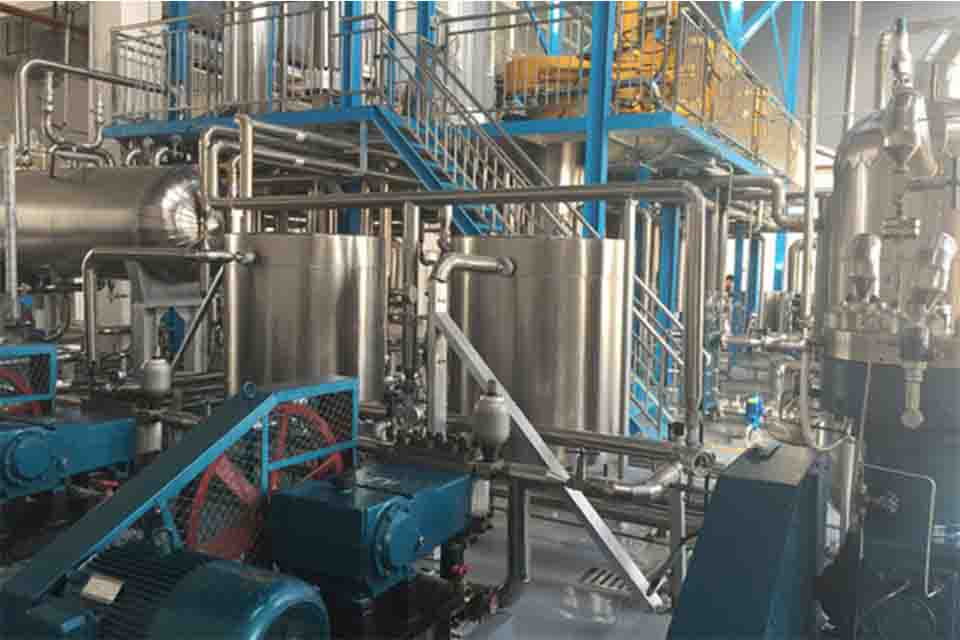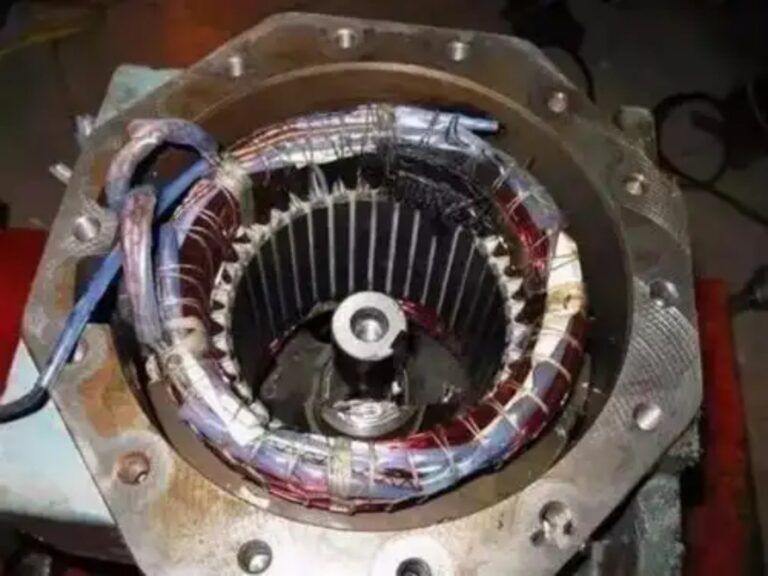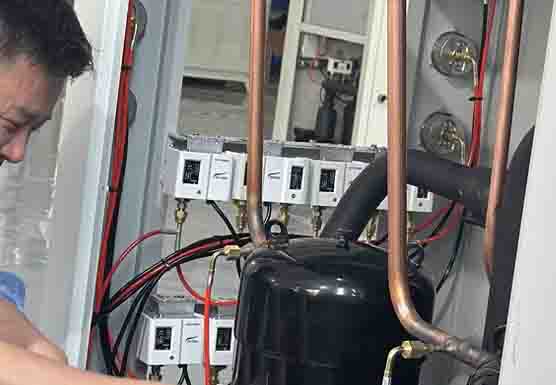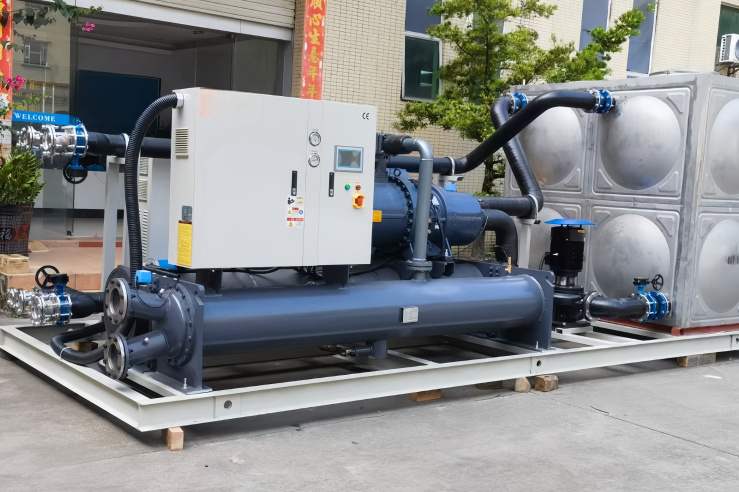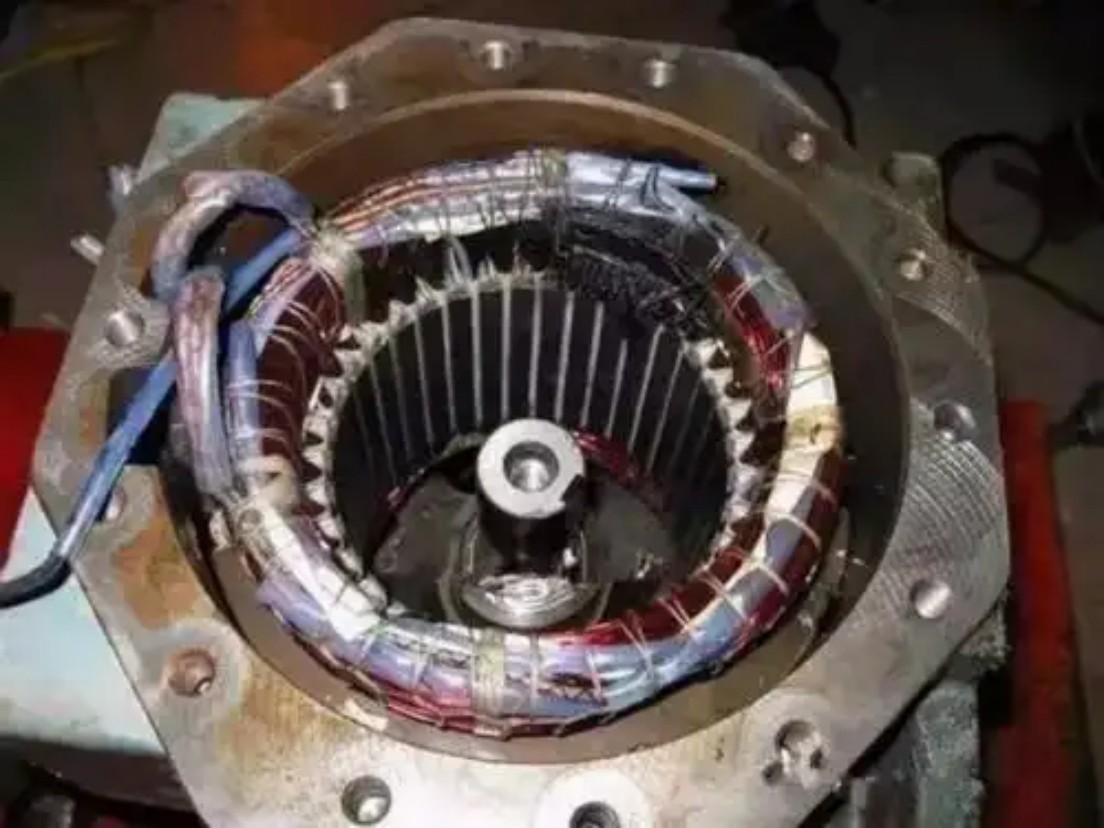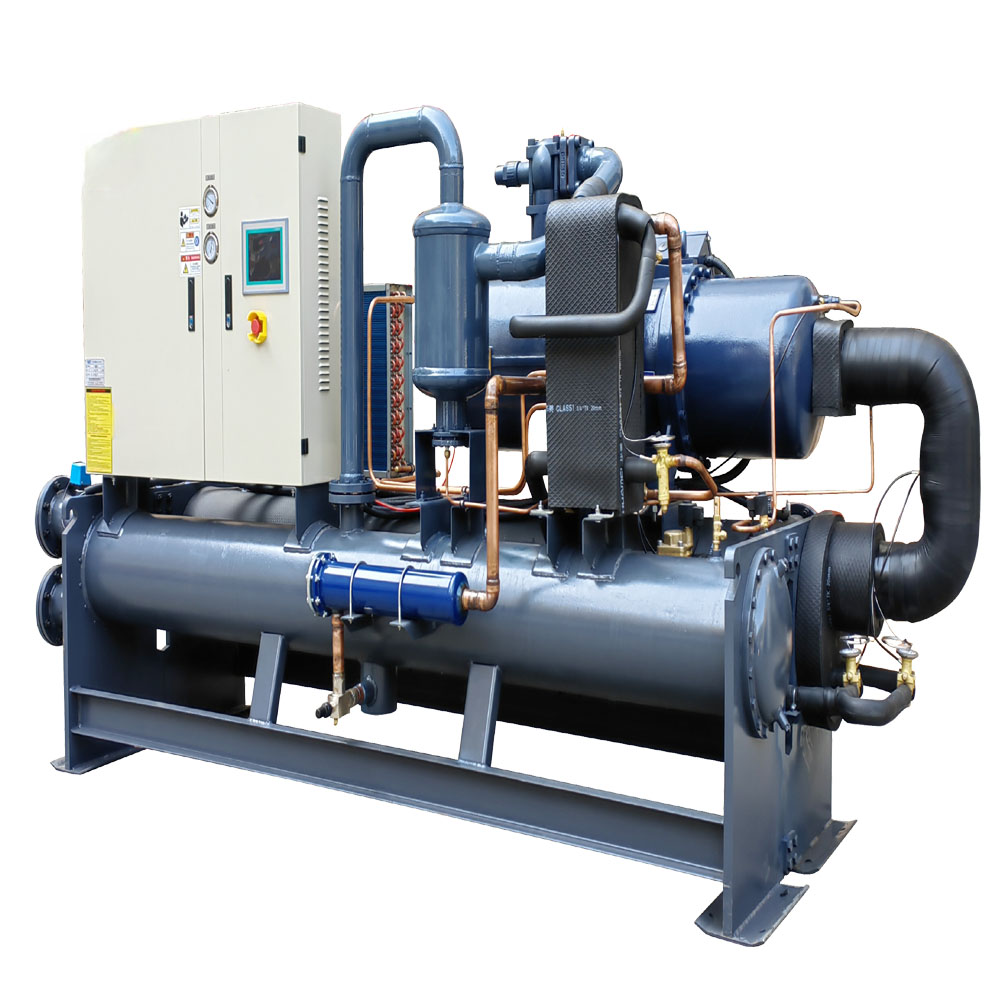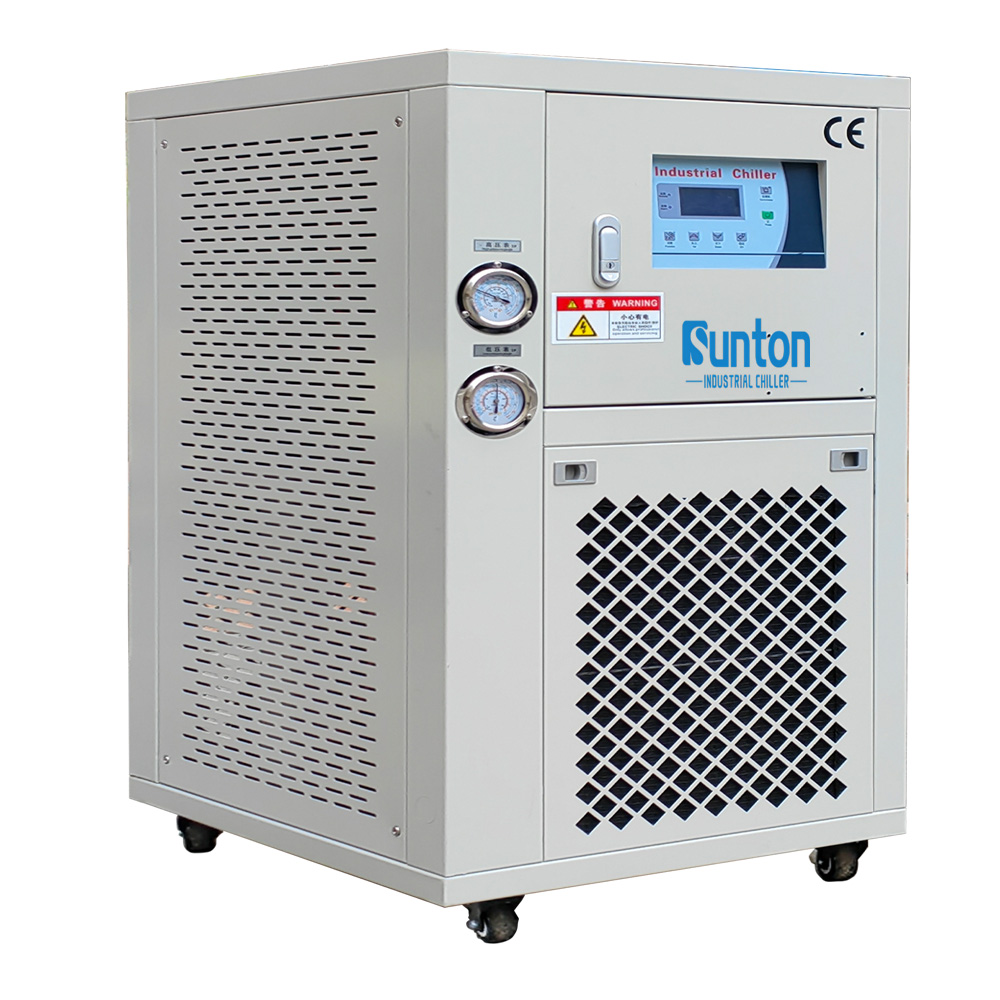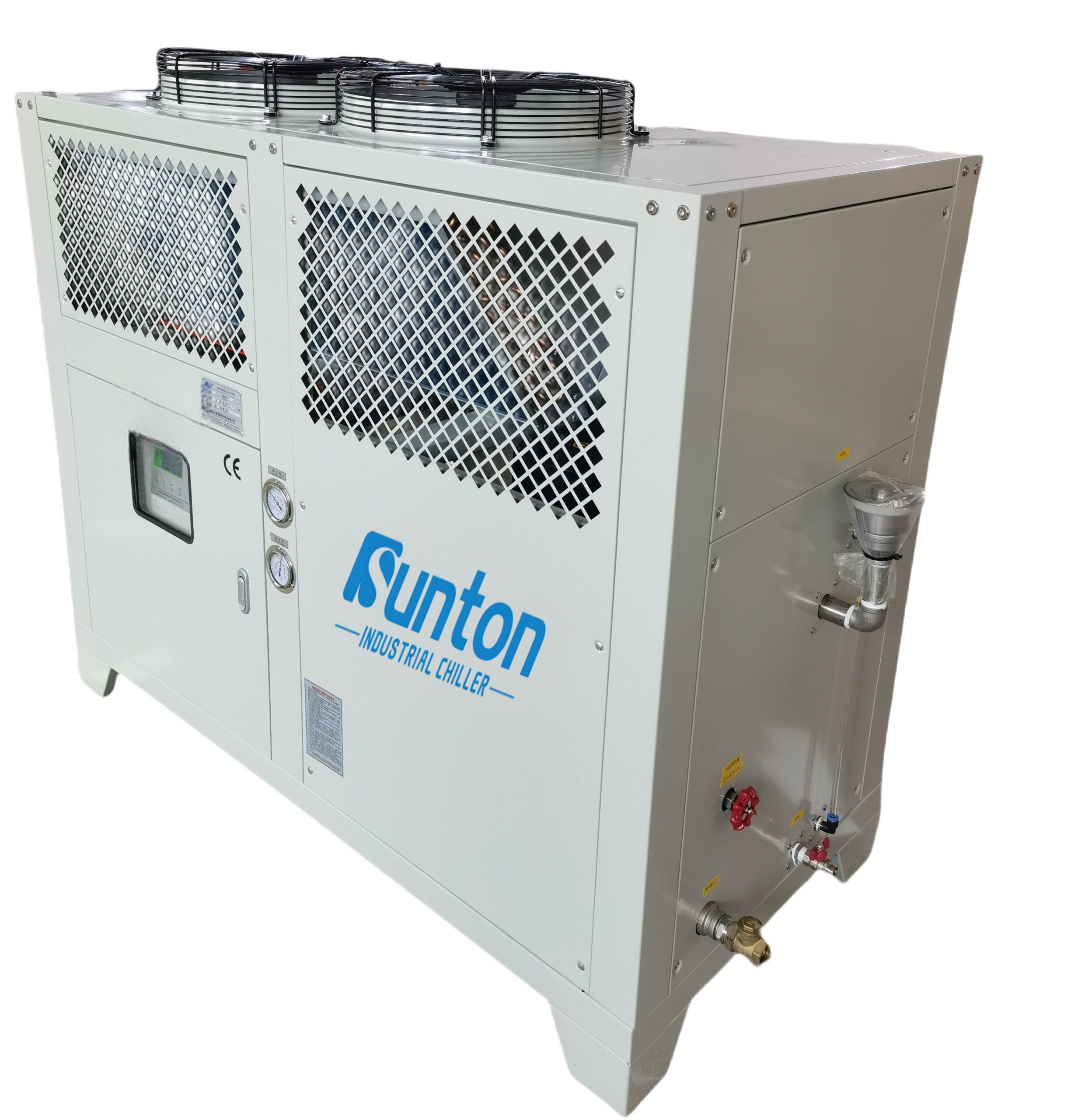-
Khu công nghiệp Dalingshan Quảng Đông
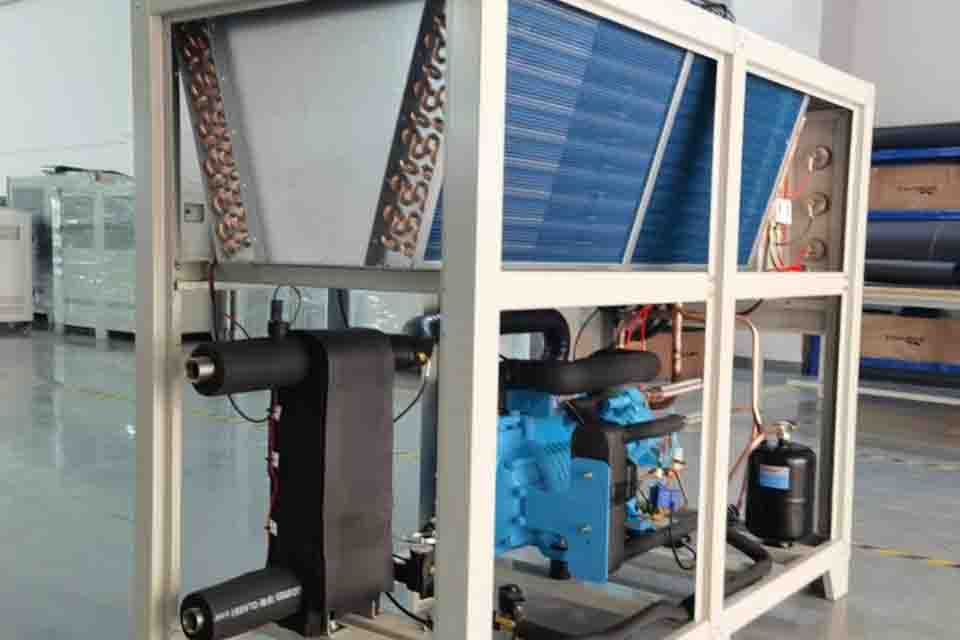
6 ưu điểm của máy làm lạnh không khí đóng gói
Máy làm lạnh không khí đóng gói: Giải pháp làm mát tối ưu cho các ứng dụng công nghiệp
Là một nhà máy sản xuất máy làm lạnh nước công nghiệp, chúng tôi hiểu vai trò quan trọng của các hệ thống làm mát hiệu quả và đáng tin cậy trong nhiều ngành công nghiệp. Bài viết này đi sâu vào thế giới của máy làm lạnh làm mát bằng không khí đóng gói, khám phá nhiều lợi thế, ứng dụng đa dạng của chúng và lý do tại sao chúng là lựa chọn ưu tiên cho các doanh nghiệp trong các ngành nhựa và cao su, gia công, thực phẩm và đồ uống, hóa chất và dược phẩm, điện tử, laser, in ấn, y tế, phòng thí nghiệm và nghiên cứu, và trung tâm dữ liệu. Cho dù bạn đang tìm cách tối ưu hóa quy trình sản xuất, giảm chi phí vận hành hay nâng cao chất lượng sản phẩm, hướng dẫn toàn diện này sẽ cung cấp những hiểu biết có giá trị về cách máy làm lạnh làm mát bằng không khí đóng gói có thể đáp ứng các nhu cầu cụ thể của bạn.
Mục lục
1. Máy làm lạnh không khí đóng gói là gì và nó hoạt động như thế nào?
Một gói máy làm lạnh bằng không khí là một loại hệ thống làm mát công nghiệp loại bỏ nhiệt từ chất lỏng thông qua quá trình nén hơi hoặc hấp thụ làm lạnh chu kỳ. Không giống như máy làm lạnh làm mát bằng nước, đòi hỏi một tháp giải nhiệt Và cung cấp nước, máy làm lạnh làm mát bằng không khí sử dụng không khí xung quanh để làm mát chất làm lạnh trong tụ điện. Đóng gói máy làm lạnh bằng không khí bao gồm tất cả các thành phần cần thiết, chẳng hạn như máy nén, tụ điện, máy bốc hơi, bơmvà các điều khiển được tích hợp thành một đơn vị duy nhất.
Máy làm lạnh bằng không khí hoạt động bằng cách tuần hoàn chất làm lạnh qua một hệ thống vòng kín. chất làm lạnh hấp thụ nhiệt từ chất lỏng trong quá trình máy bốc hơi, khiến nó bốc hơi. Sự bốc hơi chất làm lạnh sau đó đi vào máy nén, làm tăng áp suất và nhiệt độ của nó. Tiếp theo, chất làm lạnh có áp suất cao, nhiệt độ cao chảy đến tụ điện, Ở đâu không khí xung quanh được thổi qua các cuộn ngưng tụ, khiến chất làm lạnh ngưng tụ trở lại thành chất lỏng, giải phóng nhiệt hấp thụ vào khí quyển. Cuối cùng, chất làm lạnh lỏng đi qua một quá trình giãn nở van, làm giảm áp suất và nhiệt độ của nó và trở về máy bốc hơi để lặp lại chu kỳ.
| Thành phần | Chức năng |
| Máy nén | Tăng áp suất và nhiệt độ của hơi chất làm lạnh |
| Tụ điện | Làm mát hơi chất làm lạnh, khiến nó ngưng tụ thành chất lỏng và giải phóng nhiệt vào không khí xung quanh |
| Máy bốc hơi | Hấp thụ nhiệt từ chất lỏng trong quá trình, khiến chất làm lạnh bay hơi |
| Van giãn nở | Giảm áp suất và nhiệt độ của chất làm lạnh dạng lỏng trước khi nó đi vào bộ phận bay hơi |
| Bơm | Lưu thông chất lỏng quy trình qua bộ bay hơi |
| Kiểm soát | Theo dõi và điều chỉnh hoạt động của máy làm lạnh để duy trì nhiệt độ mong muốn và tối ưu hóa hiệu suất |
2. Những ưu điểm chính của việc sử dụng máy làm lạnh bằng không khí là gì?
Máy làm lạnh bằng không khí có nhiều ưu điểm trên truyền thống hệ thống làm mát bằng nước, làm cho chúng trở nên lý tưởng cho một phạm vi rộng phạm vi ứng dụng. Một trong những ưu điểm chính là sự đơn giản và dễ dàng cài đặt của chúng. Kể từ khi máy làm lạnh không yêu cầu Một tháp giải nhiệt hoặc một cái riêng biệt hệ thống nước, chúng có thể được lắp đặt nhanh chóng và dễ dàng, giảm thời gian và chi phí lắp đặt. Ngoài ra, hệ thống làm mát bằng không khí đòi hỏi ít bảo trì hơn so với hệ thống làm mát bằng nước vì chúng không gặp phải các vấn đề tương tự về chất lượng nước, hiện tượng đóng cặn và ăn mòn.
Một lợi thế quan trọng khác của máy làm lạnh bằng không khí là khả năng hoạt động của họ trong những khu vực có hạn chế tài nguyên nước. Vì họ không sử dụng nước để làm mát chất làm lạnh, chúng là lựa chọn tuyệt vời cho các cơ sở nằm ở những vùng khan hiếm nước hoặc những nơi muốn giảm lượng nước tiêu thụ vì lý do môi trường hoặc chi phí. Hơn nữa, máy làm lạnh bằng không khí loại bỏ nhu cầu sử dụng hóa chất xử lý nước, giúp giảm thêm chi phí vận hành và tác động đến môi trường.
Dưới đây là một số lợi ích của việc sử dụng máy làm lạnh không khí:
- Dễ dàng lắp đặt, tiết kiệm thời gian và chi phí nhân công.
- Yêu cầu bảo trì thấp hơn so với hệ thống làm mát bằng nước.
- Phù hợp với những khu vực có nguồn nước hạn chế.
- Không cần sử dụng hóa chất xử lý nước.
- Giảm chi phí vận hành.
3. Máy làm lạnh bằng không khí hiệu quả hơn máy làm lạnh bằng nước như thế nào?
Hiệu quả là một yếu tố quan trọng cần xem xét khi lựa chọn máy làm lạnh cho các ứng dụng công nghiệp. Theo lịch sử, máy làm lạnh giải nhiệt bằng nước được coi là tiết kiệm năng lượng hơn máy làm lạnh bằng không khí, đặc biệt là ở những vùng có khí hậu nóng. Tuy nhiên, những tiến bộ trong công nghệ đã cải thiện đáng kể hiệu quả của máy làm lạnh bằng không khí, khiến chúng trở thành lựa chọn cạnh tranh trong nhiều ứng dụng.
Máy làm lạnh bằng không khí có hiệu quả cao trong điều kiện khí hậu ôn hòa và có thể đạt được hiệu quả tương đương hoặc thậm chí cao hơn hiệu quả năng lượng hơn máy làm lạnh giải nhiệt bằng nước trong những điều kiện nhất định. hiệu quả của một máy làm lạnh bằng không khí bị ảnh hưởng bởi các yếu tố như nhiệt độ môi trường, thiết kế của tụ điện Và máy bốc hơivà loại máy nén đã sử dụng. Hiện đại máy làm lạnh bằng không khí thường có tính năng tiết kiệm năng lượng các thành phần, chẳng hạn như tốc độ thay đổi máy nén và các điều khiển tiên tiến, giúp tối ưu hóa hiệu suất và giảm thiểu tiêu thụ năng lượng.
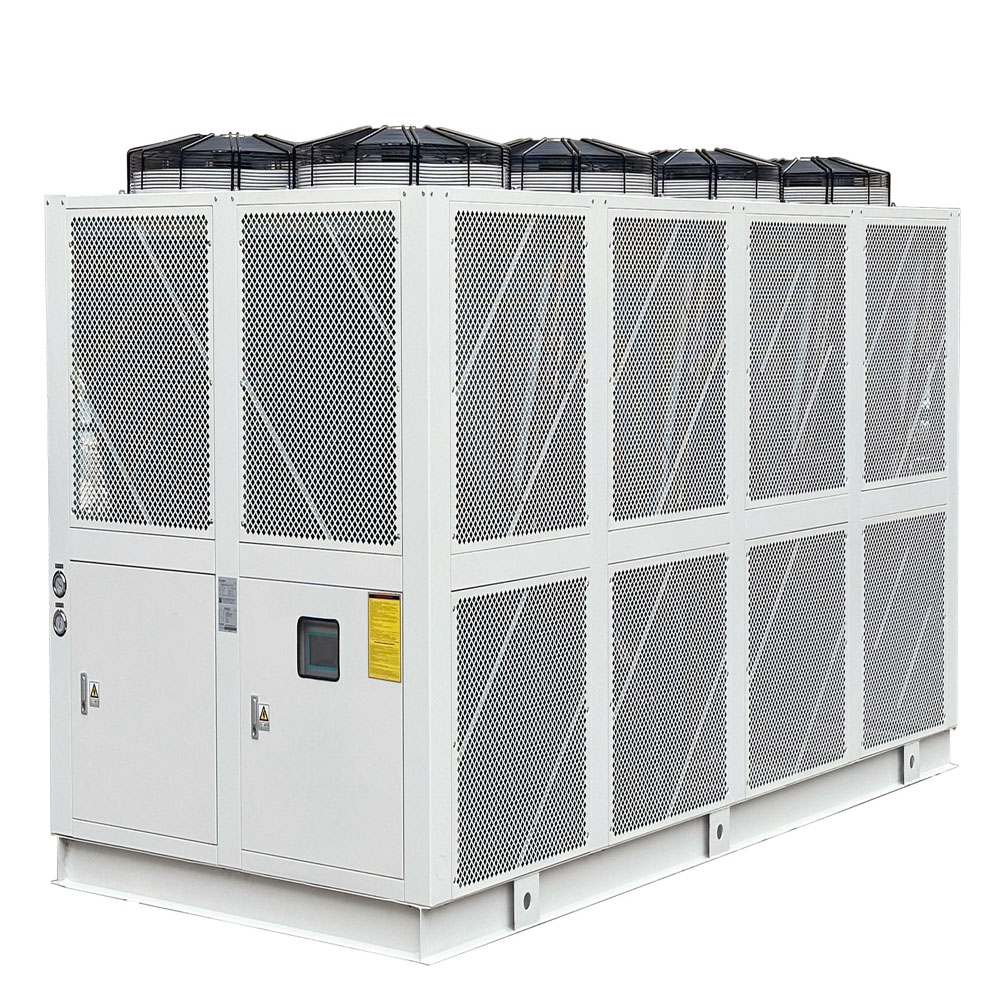
4. Ngành công nghiệp nào được hưởng lợi nhiều nhất từ máy làm lạnh không khí đóng gói?
Máy làm lạnh không khí đóng gói được sử dụng trong nhiều ngành công nghiệp khác nhau, cung cấp khả năng làm mát đáng tin cậy và hiệu quả cho nhiều quy trình và ứng dụng khác nhau. Sau đây là một số ngành công nghiệp được hưởng lợi nhiều nhất từ những điều này hệ thống làm mát:
- Ngành công nghiệp nhựa và cao su: Máy làm lạnh rất cần thiết trong ngành nhựa và cao su để làm mát khuôn, máy đùn và các thiết bị khác được sử dụng trong quá trình ép phun, đúc thổi, đùn và cán mỏng. Máy làm lạnh trục vít làm mát bằng không khí cung cấp khả năng kiểm soát nhiệt độ chính xác, đảm bảo chất lượng và tính đồng nhất của sản phẩm.
- Ngành công nghiệp gia công: Trong ngành gia công cơ khí, máy làm lạnh được sử dụng để làm mát chất lỏng cắt, trục chính và các thành phần khác trong máy CNC, máy tiện và máy phay. Duy trì nhiệt độ tối ưu giúp cải thiện tuổi thọ của dụng cụ, giảm sự giãn nở nhiệt và tăng cường độ chính xác gia công.
- Ngành thực phẩm và đồ uống: Máy làm lạnh đóng vai trò quan trọng trong ngành thực phẩm và đồ uống cho các quá trình làm mát như ủ bia, lên men, thanh trùng và làm lạnh. Máy làm lạnh Glycol thường được sử dụng trong các nhà máy bia và rượu vang để duy trì nhiệt độ chính xác trong quá trình lên men và bảo quản.
- Ngành công nghiệp hóa chất và dược phẩm: Các ngành công nghiệp hóa chất và dược phẩm dựa vào máy làm lạnh để kiểm soát nhiệt độ trong lò phản ứng, bình ngưng tụ và các thiết bị xử lý khác. Máy làm lạnh công nghiệp cho ngành mạ điện cung cấp khả năng kiểm soát nhiệt độ chính xác và có thể xử lý các vật liệu ăn mòn và nguy hiểm.
- Ngành công nghiệp điện tử: Máy làm lạnh được sử dụng trong ngành công nghiệp điện tử để làm mát thiết bị sản xuất chất bán dẫn, tia laser và các linh kiện nhạy nhiệt khác.
- Ngành công nghiệp Laser: Trong ngành công nghiệp laser, máy làm lạnh rất cần thiết để làm mát hệ thống laser, đảm bảo hoạt động ổn định và đáng tin cậy.
- Ngành in ấn: Máy làm lạnh được sử dụng trong ngành in để làm mát máy in, lô in và mực, duy trì chất lượng in và ngăn ngừa quá nhiệt.
- Ngành Y tế: Ngành y tế dựa vào máy làm lạnh để làm mát các thiết bị y tế như máy MRI, máy quét CT và máy gia tốc tuyến tính. Máy làm lạnh công nghiệp cho ngành dệt may cung cấp độ tin cậy và độ chính xác cần thiết cho các ứng dụng quan trọng này.
- Phòng thí nghiệm và Viện nghiên cứu: Các phòng thí nghiệm và viện nghiên cứu sử dụng máy làm lạnh cho nhiều ứng dụng khác nhau, bao gồm làm mát mẫu, kiểm soát nhiệt độ trong thí nghiệm và làm mát thiết bị.
- Trung tâm dữ liệu:Các trung tâm dữ liệu cần có hệ thống làm mát hiệu quả và đáng tin cậy để duy trì nhiệt độ hoạt động tối ưu cho máy chủ và các thiết bị CNTT khác. Máy làm lạnh trung tâm trục vít giải nhiệt bằng không khí cung cấp khả năng làm mát công suất lớn cho các trung tâm dữ liệu lớn, đảm bảo hoạt động không bị gián đoạn.
5. Máy làm lạnh bằng không khí có phù hợp với mọi khí hậu không?
Máy làm lạnh bằng không khí có thể hoạt động hiệu quả trong nhiều loại khí hậu khác nhau, nhưng hiệu suất của chúng bị ảnh hưởng bởi nhiệt độ môi trường. Ở những vùng khí hậu ôn hòa, máy làm lạnh bằng không khí có hiệu quả cao và có thể cung cấp khả năng làm mát đáng tin cậy trong suốt cả năm. Tuy nhiên, ở những vùng khí hậu nóng với nhiệt độ cao nhiệt độ môi trường xung quanh, các hiệu quả của máy làm lạnh bằng không khí có thể được giảm xuống, vì sự chênh lệch nhiệt độ giữa chất làm lạnh và không khí xung quanh giảm dần.
Để giải quyết thách thức này, các nhà sản xuất đã phát triển tiên tiến máy làm lạnh bằng không khí có thể hoạt động hiệu quả ngay cả ở mức cao môi trường xung quanh điều kiện. Những điều này máy làm lạnh thường có tính năng quá khổ tụ điện, quạt hiệu suất cao và các điều khiển tiên tiến giúp tối ưu hóa hiệu suất dựa trên nhiệt độ môi trường. Ngoài ra, một số máy làm lạnh bằng không khí kết hợp các hệ thống làm mát đoạn nhiệt, sử dụng nước để trướcmát mẻ cái không khí xung quanh trước khi nó đạt tới tụ điện, cải thiện hơn nữa hiệu quả ở những vùng khí hậu nóng. Việc sử dụng tháp giải nhiệt cũng có thể được xem xét.
6. Máy làm lạnh bằng không khí góp phần tiết kiệm chi phí và bảo vệ môi trường như thế nào?
Máy làm lạnh bằng không khí cung cấp đáng kể tiết kiệm chi phí và lợi ích về môi trường so với truyền thống hệ thống làm mát bằng nước. Bằng cách loại bỏ nhu cầu về một tháp giải nhiệt và giảm Nước sự tiêu thụ, máy làm lạnh bằng không khí có thể giảm chi phí vận hành, đặc biệt là ở những khu vực có chi phí nước cao hoặc hạn chế tài nguyên nước. Ngoài ra, máy làm lạnh bằng không khí không yêu cầu hóa chất xử lý nước, giúp giảm thêm chi phí vận hành và giảm thiểu tác động môi trường liên quan đến việc sử dụng và thải bỏ hóa chất.
Máy làm lạnh bằng không khí cũng có thể góp phần tiết kiệm năng lượng, đặc biệt là khi được trang bị tiết kiệm năng lượng các thành phần như tốc độ thay đổi máy nén và các điều khiển nâng cao. Các tính năng này cho phép máy làm lạnh để điều chỉnh công suất của nó dựa trên tải làm mát, giảm thiểu tiêu thụ năng lượng trong thời gian nhu cầu thấp. Hơn nữa, máy làm lạnh bằng không khí có thể được tích hợp với các công nghệ tiết kiệm năng lượng khác, chẳng hạn như hệ thống làm mát miễn phí, sử dụng năng lượng thấp nhiệt độ môi trường xung quanh để cung cấp làm mát không chạy máy nén.
7. Các thành phần chính của máy làm lạnh không khí đóng gói là gì?
MỘT máy làm lạnh không khí đóng gói bao gồm một số thành phần chính hoạt động cùng nhau để cung cấp khả năng làm mát hiệu quả và đáng tin cậy. Các thành phần chính bao gồm:
- Máy nén: Các máy nén là trái tim của làm lạnh hệ thống, chịu trách nhiệm nén chất làm lạnh hơi nước và tăng áp suất và nhiệt độ của nó.
- Tụ điện: Các tụ điện là một bộ trao đổi nhiệt làm mát áp suất cao, nhiệt độ cao chất làm lạnh hơi nước, khiến nó ngưng tụ thành chất lỏng. Trong máy làm lạnh bằng không khí, các tụ điện được làm mát bằng không khí xung quanh được quạt thổi qua các cuộn dây ngưng tụ.
- Máy bốc hơi: Các máy bốc hơi là một bộ trao đổi nhiệt khác hấp thụ nhiệt từ chất lỏng trong quá trình, gây ra chất làm lạnh để bốc hơi. nước lạnh hoặc chất lỏng xử lý sau đó được lưu thông đến ứng dụng để cung cấp làm mát.
- Van giãn nở: Sự mở rộng van làm giảm áp suất và nhiệt độ của chất lỏng chất làm lạnh trước khi nó đi vào máy bốc hơi.
- Bơm: Các bơm tuần hoàn chất lỏng quy trình thông qua máy bốc hơi và ứng dụng.
- Kiểm soát: Các điều khiển giám sát và điều chỉnh hoạt động của máy làm lạnh, bao gồm cả máy nén, người hâm mộ, bơmvà mở rộng van, để duy trì nhiệt độ mong muốn và tối ưu hóa hiệu suất.
8. Làm thế nào để chọn được máy làm lạnh bằng không khí phù hợp với nhu cầu cụ thể của bạn?
Lựa chọn đúng đắn máy làm lạnh bằng không khí đối với nhu cầu cụ thể của bạn đòi hỏi phải cân nhắc cẩn thận một số yếu tố, bao gồm khả năng làm mát, hiệu quả, điều kiện vận hành và yêu cầu ứng dụng. Sau đây là một số yếu tố chính cần xem xét:
- Công suất làm mát: Công suất làm mát của máy làm lạnh phải phù hợp với tải làm mát của ứng dụng. Điều cần thiết là phải tính toán chính xác tải làm mát, có tính đến các yếu tố như nhiệt do thiết bị hoặc quy trình tạo ra, nhiệt độ mong muốn và lưu lượng của chất lỏng quy trình.
- Hiệu quả: Hãy xem xét hiệu quả năng lượng của máy làm lạnh, đặc biệt nếu chi phí năng lượng là mối quan tâm đáng kể. Tìm kiếm máy làm lạnh với cao hiệu quả xếp hạng và tiết kiệm năng lượng các thành phần, chẳng hạn như tốc độ thay đổi máy nén và các điều khiển tiên tiến.
- Điều kiện hoạt động: Đánh giá các điều kiện hoạt động, bao gồm nhiệt độ môi trường phạm vi và sự sẵn có của tài nguyên nước. Nếu hoạt động ở nơi có khí hậu nóng, hãy cân nhắc máy làm lạnh bằng không khí được thiết kế cho cao môi trường xung quanh hoặc những điều kiện có hệ thống làm mát đoạn nhiệt.
- Yêu cầu ứng dụng:Cần xem xét các yêu cầu cụ thể của ứng dụng, chẳng hạn như phạm vi nhiệt độ mong muốn, loại chất lỏng quy trình và bất kỳ cân nhắc đặc biệt nào, chẳng hạn như nhu cầu kiểm soát nhiệt độ chính xác hoặc sự hiện diện của vật liệu ăn mòn hoặc nguy hiểm.
9. Yêu cầu lắp đặt và bảo trì đối với máy làm lạnh bằng không khí là gì?
Máy làm lạnh bằng không khí thường dễ cài đặt và bảo trì hơn máy làm lạnh giải nhiệt bằng nước. Vì họ không yêu cầu một tháp giải nhiệt hoặc một cái riêng biệt hệ thống nước, quá trình cài đặt đơn giản hơn và ít tốn thời gian hơn. Máy làm lạnh bằng không khí có thể lắp đặt ngoài trời, trên mái nhà hoặc trong phòng máy, mang lại sự linh hoạt về mặt địa điểm.
Yêu cầu bảo trì cho máy làm lạnh bằng không khí cũng thường thấp hơn so với máy làm lạnh giải nhiệt bằng nước. Các nhiệm vụ bảo trì thường xuyên bao gồm vệ sinh tụ điện cuộn dây, kiểm tra chất làm lạnh sạc, kiểm tra quạt và động cơ, và theo dõi hoạt động của các bộ điều khiển. Điều cần thiết là phải tuân theo các khuyến nghị của nhà sản xuất về bảo trì và lên lịch kiểm tra thường xuyên bởi các kỹ thuật viên có trình độ.
10. Tại sao nên chọn nhà máy sản xuất máy làm lạnh nước công nghiệp của chúng tôi để đáp ứng nhu cầu làm mát của bạn?
Là một ngành công nghiệp hàng đầu máy làm lạnh nước nhà máy sản xuất, chúng tôi cam kết cung cấp chất lượng cao, đáng tin cậy và tiết kiệm năng lượng giải pháp làm mát cho nhiều ngành công nghiệp khác nhau. máy làm lạnh không khí đóng gói được thiết kế và sản xuất theo tiêu chuẩn cao nhất, sử dụng các linh kiện cao cấp và công nghệ tiên tiến để đảm bảo hiệu suất và độ bền tối ưu.
Chúng tôi cung cấp một loạt các máy làm lạnh bằng không khí, từ các đơn vị công suất nhỏ cho các ứng dụng trong phòng thí nghiệm đến các hệ thống công suất lớn cho các quy trình công nghiệp. máy làm lạnh có sẵn trong nhiều cấu hình khác nhau, bao gồm cuộn, vít, và ly tâm máy nénvà có thể tùy chỉnh để đáp ứng nhu cầu cụ thể của bạn. Chúng tôi cũng cung cấp nhiều tùy chọn và phụ kiện, chẳng hạn như hệ thống làm mát đoạn nhiệt, hệ thống làm mát miễn phí và các điều khiển tiên tiến, để nâng cao hiệu suất và hiệu quả.
Đội ngũ kỹ sư và kỹ thuật viên giàu kinh nghiệm của chúng tôi luôn tận tâm cung cấp dịch vụ và hỗ trợ khách hàng đặc biệt. Chúng tôi làm việc chặt chẽ với khách hàng để hiểu các yêu cầu riêng biệt của họ và phát triển các giải pháp phù hợp với nhu cầu cụ thể của họ. Chúng tôi cũng cung cấp các dịch vụ lắp đặt, bảo trì và sửa chữa toàn diện để đảm bảo rằng máy làm lạnh hoạt động ở hiệu suất cao nhất trong suốt vòng đời của nó.
Câu hỏi thường gặp
1. Sự khác biệt giữa máy làm lạnh bằng không khí và máy làm lạnh bằng nước là gì?
Sự khác biệt chính là cách chúng làm mát chất làm lạnh. Máy làm lạnh bằng không khí sử dụng không khí xung quanh, trong khi máy làm lạnh bằng nước sử dụng nguồn nước, thường là từ tháp giải nhiệt. Điều này làm cho máy làm lạnh bằng không khí dễ lắp đặt và bảo trì hơn, trong khi máy làm lạnh bằng nước thường tiết kiệm năng lượng hơn ở những vùng có khí hậu nóng hơn.
2. Máy làm lạnh không khí có thể sử dụng để điều hòa không khí không?
Có, máy làm lạnh không khí có thể được sử dụng cho hệ thống điều hòa không khí, đặc biệt là trong các tòa nhà thương mại hoặc công nghiệp lớn. Chúng có thể được kết nối với các bộ phận quạt gió hoặc bộ phận xử lý không khí để phân phối không khí mát khắp tòa nhà.
3. Tuổi thọ của máy làm lạnh bằng không khí là bao lâu?
Tuổi thọ của máy làm lạnh không khí phụ thuộc vào nhiều yếu tố, bao gồm chất lượng thiết bị, điều kiện vận hành và các biện pháp bảo trì. Với việc bảo trì đúng cách, máy làm lạnh không khí được chế tạo tốt có thể sử dụng được 15-20 năm hoặc hơn.
4. Máy làm lạnh không khí hệ thống tách rời là gì?
Máy làm lạnh không khí hệ thống tách biệt tách bộ phận ngưng tụ (chứa máy nén và bộ ngưng tụ) khỏi bộ phận bay hơi. Điều này cho phép linh hoạt hơn trong quá trình lắp đặt, vì bộ phận ngưng tụ có thể được đặt ngoài trời trong khi bộ phận bay hơi được đặt trong nhà gần ứng dụng.
5. Máy làm lạnh bằng không khí nên được bảo dưỡng bao lâu một lần?
Nên bảo dưỡng máy làm lạnh bằng không khí ít nhất một lần một năm bởi một kỹ thuật viên có trình độ. Bảo dưỡng thường xuyên giúp đảm bảo hiệu suất tối ưu, ngăn ngừa sự cố và kéo dài tuổi thọ của thiết bị.
6. Chất làm lạnh nào được sử dụng trong máy làm lạnh bằng không khí?
Loại chất làm lạnh được sử dụng trong máy làm lạnh bằng không khí thay đổi tùy theo nhà sản xuất và kiểu máy cụ thể. Các chất làm lạnh phổ biến bao gồm R-410A, R-407C và R-134a. Các chất làm lạnh này được lựa chọn vì tính chất làm mát, tác động đến môi trường và tuân thủ các quy định.
Những điểm chính
- Máy làm lạnh bằng không khí cung cấp giải pháp làm mát đơn giản, đáng tin cậy và tiết kiệm chi phí cho nhiều ứng dụng công nghiệp.
- Chúng dễ lắp đặt hơn và ít cần bảo trì hơn máy làm lạnh giải nhiệt bằng nước.
- Máy làm lạnh bằng không khí phù hợp với những khu vực có hạn chế tài nguyên nước và có thể đóng góp vào tính bền vững của môi trường.
- Những tiến bộ trong công nghệ đã cải thiện đáng kể hiệu quả của máy làm lạnh bằng không khí, khiến chúng trở thành lựa chọn cạnh tranh trong nhiều ứng dụng.
- Lựa chọn đúng đắn máy làm lạnh bằng không khí đòi hỏi phải cân nhắc cẩn thận các yếu tố như khả năng làm mát, hiệu quả, điều kiện vận hành và yêu cầu ứng dụng.
- Bảo trì thường xuyên là điều cần thiết để đảm bảo hiệu suất tối ưu và kéo dài tuổi thọ của máy làm lạnh bằng không khí.
- Là một ngành công nghiệp máy làm lạnh nước nhà máy sản xuất, chúng tôi cung cấp chất lượng cao, đáng tin cậy và tiết kiệm năng lượng máy làm lạnh bằng không khí phù hợp với nhu cầu cụ thể của bạn.
Để biết thêm thông tin về chúng tôi máy làm lạnh không khí đóng gói và cách chúng có thể mang lại lợi ích cho doanh nghiệp của bạn, vui lòng khám phá trang web của chúng tôi hoặc hãy gọi cho chúng tôi ngay hôm nay. Chúng tôi mong muốn được giúp bạn tìm ra giải pháp làm mát hoàn hảo cho nhu cầu của bạn.
